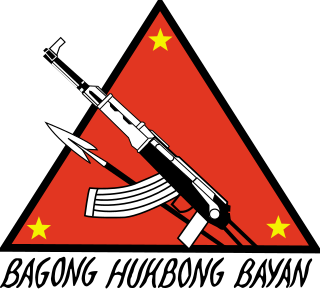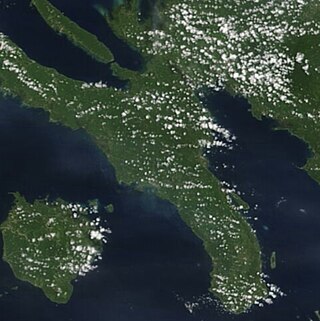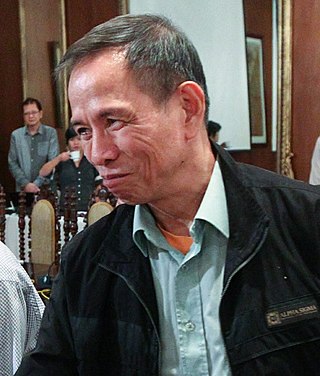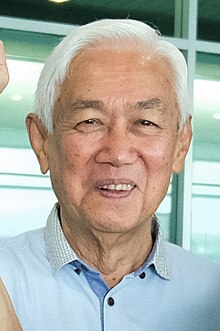
The New People's Army is the armed wing of the Communist Party of the Philippines (CPP). It acts as the CPP's principal organization, aiming to consolidate political power from what it sees as the present "bourgeois reactionary puppet government" and to aid in the "people's democratic revolution". Founded on March 29, 1969, by the collaboration of Jose Maria Sison and former members of the Hukbalahap led by Bernabe Buscayno, the NPA has since waged a guerrilla war based on the Maoist strategy of protracted people's war. The NPA is one of the key figures in the ongoing communist rebellion in the Philippines, the longest ongoing conflict in the country.

The Communist Party of the Philippines is a far-left, Marxist–Leninist–Maoist revolutionary organization and communist party in the Philippines, formed by Jose Maria Sison on 26 December 1968.

Jose Maria Canlas Sison, also known as Joma, was a Filipino writer, poet, and activist who founded and led the Communist Party of the Philippines (CPP) and added elements of Maoism to its philosophy—which would be known as National Democracy. His ideology was formed by applying Marxism–Leninism–Maoism to the history and circumstances of the Philippines.

The National Democratic Front of the Philippines is a coalition of revolutionary social and economic justice organizations, agricultural unions, trade unions, indigenous rights groups, leftist political parties, and other related groups in the Philippines. It belongs to the much broader National Democracy Movement and the communist rebellion in the Philippines.

The Bondoc Peninsula is a narrow peninsula located in the southeastern part of Quezon Province in Calabarzon Region, southern part of Luzon, Philippines. The peninsula consists of 12 municipalities: Agdangan, Buenavista, Catanauan, General Luna, Macalelon, Mulanay, Padre Burgos, Pitogo, San Andres, San Francisco, San Narciso and Unisan, all in the 3rd Congressional District of Quezon and 325 total barangays. The peninsula is known for featuring beautiful beaches and historic churches and for holding the Buenavista Protected Landscape archaeological site at the peak of the tallest peak of Mount Maclayao. The peninsula remained largely agricultural with copra as its produce.

Alberto Baldovino Ramento was the ninth supreme bishop and a former chairperson of the Supreme Council of Bishops of the Philippine Independent Church or Iglesia Filipina Independiente (IFI). He was known by the moniker, "The Bishop of the Poor Peasants and Workers". A known vocal critic against human rights abuses in the Philippines, he was murdered by unknown assailants in 2006, with his case currently remains unsolved.
The Second Great Rectification Movement refers to a 1992 ideological campaign initiated by the leadership of the Communist Party of the Philippines (CPP) wherein an effort was made to "identify, repudiate and rectify the errors of urban insurrectionism, premature big formations of the New People's Army and anti-infiltration hysteria". The rectification movement resulted in the once monolithic Filipino communist party fragmenting into at least eight warring factions during the 1990s.

Benito Tiamzon was a Filipino political organizer and until his arrest in March 2014 by Philippine security forces, was believed to be the Chairman of the Communist Party of the Philippines (CPP) and its armed wing, the New People's Army (NPA).
Jose "Joe" Pacturayan Dizon was a Filipino priest and activist who fought against the dictatorship of then President Ferdinand Marcos.
Antonio Maria "Tony" Onrubia Nieva was a Filipino journalist, union organizer, and activist. He worked to defend press freedom and the rights of workers, and campaigned to end authoritarian rule in the Philippines. He led the National Press Club as president and founded the National Union of Journalists of the Philippines. He was secretary general of the International Organization of Journalists based in Prague, Czech Republic, from 1995 up to the time of his death in 1997. His name is on the Bantayog ng mga Bayani Wall of Remembrance, for his contributions to the fight against injustices of the dictatorship under President Ferdinand E. Marcos.
Religious sector opposition against the dictatorship of President Ferdinand Marcos included leaders and workers belonging to different beliefs and denominations.
In the Philippines, red-tagging is the labeling of individuals or organizations as communists, subversives, or terrorists, regardless of their actual political beliefs or affiliations. It is a type of harassment and has pernicious effects on its targets. Red-tagging has been practiced by security forces, government officials and shills.
Fidel V. Agcaoili, also known as Ka Fidel, was a Filipino activist and revolutionary. He was a member of the Communist Party of the Philippines' Central Committee, along with Jose Maria Sison and Luis Jalandoni during the Marcos dictatorship. In 1974, he was arrested and became the longest detained political prisoner under Marcos, being imprisoned for 11 years. On his release, Agcaoili founded the Samahan ng mga Ex-Detainee Laban sa Detensyon at Aresto (SELDA), a prisoners' rights organization.
Antonio De Leon Zumel II, also known by his nicknames Tony, Manong, Ching and Antumel, was a Filipino journalist, activist, and leftist revolutionary. He was two-time President of the National Press Club of the Philippines before going underground in 1972 at the start of the Marcos dictatorship. In 1990, he was elected Chairperson of the National Democratic Front of the Philippines in absentia, and was a senior adviser to the NDFP negotiating panel from 1994 until his death in 2001.

Fraud: Gloria Macapagal-Arroyo and the May 2004 Elections is a 2006 book about the electoral scandal surrounding Gloria Macapagal Arroyo's 2004 reelection to the Philippine presidency. Published by the Center for People Empowerment in Governance Books, it was edited by the center's Policy Study director Bobby M. Tuazon, with the preface provided by Temario C. Rivera. The book received positive reviews from critics.

Rafael Ledesma Jalandoni was a Philippine Constabulary officer who served as the 3rd Chief of Staff of the Armed Forces of the Philippines. He was appointed by President Manuel Roxas in 1946 after gaining independence from United States. He retired in 1948.

Urban areas in the Philippines such as Metro Manila, Metro Cebu, and Metro Davao have large informal settlements. The Philippine Statistics Authority defines a squatter, or alternatively "informal dwellers", as "One who settles on the land of another without title or right or without the owner's consent whether in urban or rural areas". Squatting is criminalized by the Urban Development and Housing Act of 1992, also known as the Lina Law. There have been various attempts to regularize squatter settlements, such as the Zonal Improvement Program and the Community Mortgage Program. In 2018, the Philippine Statistics Authority estimated that out of the country's population of about 106 million, 4.5 million were homeless.
Revolution Selfie: The Red Battalion is a 2017 documentary film that follows director Steven de Castro in travelling to the Philippines to meet with the New People's Army. The film is notable for being shot almost entirely from first-person point of view in part simulated video gameplay.

The Christians for National Liberation is an underground revolutionary mass organization in the Philippines committed to uniting Christians in the revolution led by the Communist Party of the Philippines. A member of the National Democratic Front of the Philippines, it supports the armed struggle waged by the New People's Army and led by the Communist Party of the Philippines.










